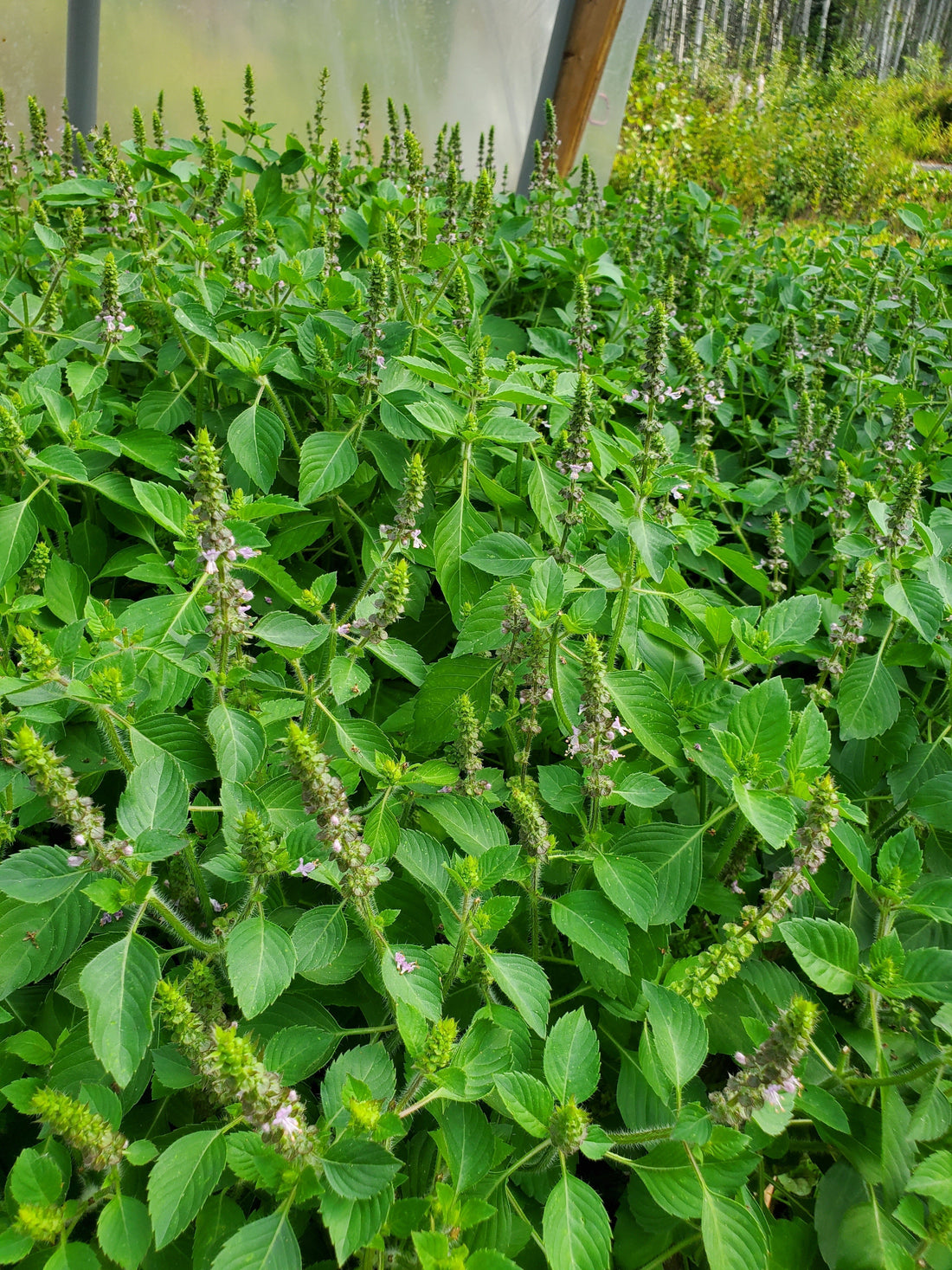
Tulsi Basil Monograph - Ocimum Sanctum
Share

Common Name - Tulsi Basil
Latin Name - Ocimum Sanctum (3), (Syn. O. tenuiflorum), O. gratissimum) (5)Folk Names - Holy Basil, Elixir of Life, Queen of Herbs, The Incomparable One, Mother Medicine of Nature (1) (3)
Plant family - Lamiaceae

Origins and History - Holy Basil is an herbaceous plant in the mint family (Lamiaceae) that is native to South Asia. It grows throughout lowland regions of India, Sri Lanka, Pakistan, Bangladesh, southern China, Thailand, and Malaysia.In India, holy basil is considered sacred to the Hindu god Vishnu, who considered basil the incarnation of the Goddess herself. In Sanksrit, tulasi means “that which is incomparable”, and in Hindi this word is tulsi, hence its common names.(4) Holy basil is a sacred plant in the Hindu religion. The species epithet (name), sanctum, refers to this sacredness. In Sanskrit, tulsi means “beyond compare.” It is also referred to as an elixir of life, queen of herbs, and Mother Nature of medicine in the Hindu culture. This plant is sacred to the Hindu god Vishnu. Vishnu’s wife, Tulasi, took the form of this herb when she came to earth. Besides being used in morning prayers, the wood of tulsi is used as beads in meditation, similar to how many cultures use prayer beads. (5)
Botanical description - Tulsi is a fragrant, bushy perennial shrub. It is not frost-tolerant, however, so grows as an annual in more temperate climates. The leaves are arranged in opposite pairs on a slightly hairy stem, and its beautiful blooms are arranged tightly in a long raceme, ranging in color from white to reddish purple. The flowers bloom in mid-summer and are loved by pollinators. (2)

Parts of plant used - Leaves, Flowers
Taste - Pungent, aromatic, sweet (3) (5)
Energetics - Warming, Drying (3) (5)
Medicinal actions - Carminative, Nervine relaxant, Immune Stimulant, Antimicrobial, Stimulant Expectorant, Decongestant, Nootropic, , Adaptogen. (2) (3) Stimulant and Relaxant Diaphoretic. (1) Nueroprotective, Immunomodulator, Analgesic. (5)Plant Uses - Stress, anxiety, high blood pressure, viral infections, fungal infections, depression, colds and flus, herpes simplex virus (HSV), high blood sugar, allergic rhinitis, ulcers, pain (5) In my own experience using Tulsi, I have found it to be very grounding and helps me find courage in challenging social situations. Before I perform or speak publicly I take some Tulsi tincture.
Plant preparations - Tea, decoction, tincture, fresh juice, poultice, powder, infused into ghee or honey (5)

Doses - Tincture (fresh herb): 1:2, 75% alcohol, 3 to 5 mL, 3 times per day. Tea: 1 teaspoon to 2 cups (by volume) or 2 grams to 113 grams (by weight), up to a total of 4 ounces per day (5) I have had excellent results tincturing with 50 percent alcohol. For home use I often use what alcohol is available.
Safety- Holy basil may have an anti-fertility effect on both men and women and thus should not be taken by couples wishing to conceive or by pregnant women. Those who are taking insulin to control their diabetes may need to adjust their insulin levels while taking holy basil. If holy basil is being used to assist with blood sugar control, it is best to use it consistently and dependably so that insulin treatments can be somewhat consistent from day to day. (5)
My observations and musings.
When I moved to northern British Columbia, I was concerned about the viability of growing certain medicinal herbs, Tulsi being one of the main herbs I fretted about. After being here for a few years I have witnessed the vitality and resilience of this tropical plant in our northern climates. We have just 108 frost free growing days, but our Tulsi is abundant in our greenhouses, and surprisingly does well outside too. I think this is attributed to our long sunlight hours, unique to the northern landscapes. We receive up to 17.5 hours of sun in our summers ! This plant is magnificently resilient and adaptable and has surprised us time and time again with it’s abundance.
I have chronic pain from injuries, specifically back pain. I find Tulsi very complimentary to my herbal pain management regime. It appears to have an analgesic affect, but also I feel my vitality rise whn using the tincture specifically. Chronic pain can be very tiring and my observation is Tulsi helps invigorate my energy levels and cognition.
References/Research
1.https://www.herbrally.com/monographs/tulsi-rh
Monograph by Ruthie Hays
2.https://www.herbrally.com/monographs/tulsi
Monograph by Krystal Thompson
3.https://www.evolutionaryherbalism.com/2023/07/18/holy-basil/
Monograph by Sajah Popham
4.https://www.motherearthnews.com/natural-health/a-close-study-of-holy-basil-zbcz1502/
Monograph by Jane Cookman Metzger
5.https://www.learningherbs.com/blog/holy-basil-uses#gsc.tab=0
Monograph by Rosalee de la Forêt